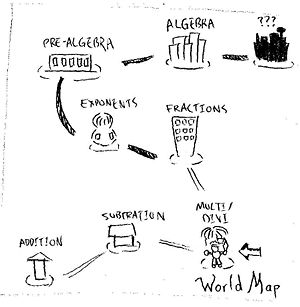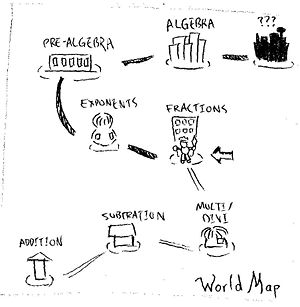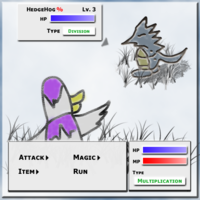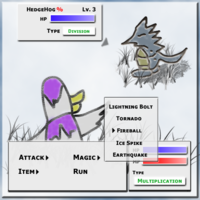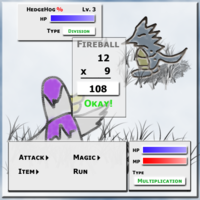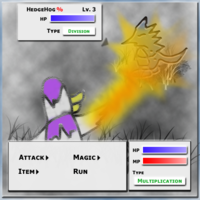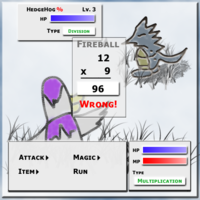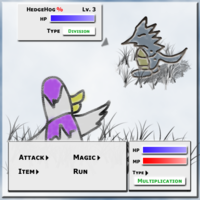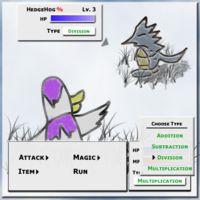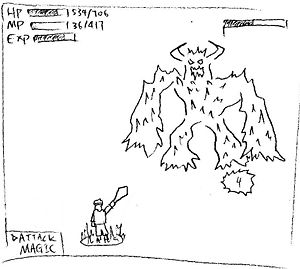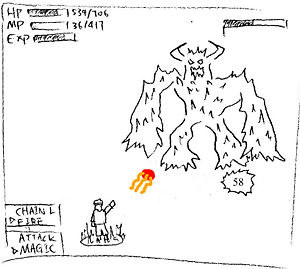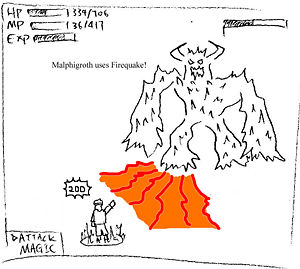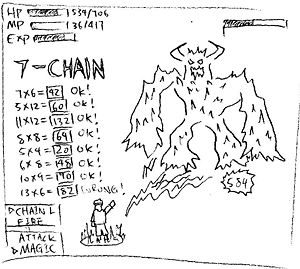Contextual Inquiry and Task Analysis-Group:BuTtErFlY
From CS 160 Fall 2008
Contents |
Team
| Name | Contribution |
|---|---|
| Gary Wu | Performed an interview and provided storyboards/sketches for interface design |
| Mike Kendall | Performed an interview and wrote out task analysis |
| Mohammed Ali | Performed two interviews on different games on the same user. |
| Hao Luo | Wrote the interface design section, provided storyboards/sketches/descriptions for two tasks |
| Jordan Berk | Task Analysis Questions, Analysis of Approach |
Target Users
| Info | Gary's Subject | Mike's Subject | Mohammed's Subject |
|---|---|---|---|
| Grade | 6th | 4th | 5th |
| Likes School | Moderate | :) | High |
| Has a Tutor | No | No | Yes |
| Math Level | Moderate | :( | High |
| Plays Video Games | Excessive | Nopers | Moderate |
| Plays RPG | Yes, likes them a lot | No | No |
| Dislikes | homework, little brother, doing the dishes | vegetables, mean girls | monsters, fast paced games |
| Rationale for Selecting | a. RPG-superuser with a moderate skill set in Mathematics
b. On the older end of our target user age range | this covers the non-mathy, non-gamer crowd... the kids who might be asked (forced) to play an educational game by their parents | This user is one that is a gamer and like math, however, has little experience with RPG's |
Problem and Solution Overview
Students often lack the motivation of learning math. They often shy away from learning math because they simply find it to be useless in everyday life. The problem case here is to provide a means to help students understand how and when math skills can be useful to everyday situations.
Our solution is to integrate math questions with an RPG world in which progress is made by upgrading your character, defeating enemies and advancing levels. To accomplish these tasks, learning and using math is required, thereby making math problems the driving force of the game. Because performing these tasks is fun and rewarding, the user has motivation to learn and use math.
Contextual Inquiry - Interview Descriptions
Gary's Interview
Method: The interview would take place in the subject's home environment. An introductory spiel will be given to the subject about the process. Some basic personal questions will be asked and recorded. The interviewer will bring in an RPG game and watch the subject play. While asking questions about gameplay motives, the interviewer will attempt to understand the game flow process from the perspective of the user. After the game play session is complete, further questions will be asked to gain an insight on what the subjects feels about Math related games.
Process: We sat down in front of his living room tv and plugged in the Playstation. I put in the game I brought with me, Final Fantasy 8, and asked if he had played it before. He said he tried, but never really started. This was a good sign, as I wanted him to be unfamiliar with the interface. As the game was loading, we made some small talk; I asked him how school was, what he liked and disliked, and in general just tried to make him feel comfortable around me. Once the game began, I took out my pen and pad and started 'inquiring' about his actions.
Me: I see you're renaming the character. Why don't you just use the defaults? A: I like customizing my characters and making them my own. Me: I noticed you're not really reading the tutorials. I thought you never played this game before? A: I hate sitting through them. It's for newbs. I can figure it out while playing. Me: You must play a lot of games. A: Kind of. RPGs are like, all the same. Just different stuff like the monsters and weapons. Me: How do you know where to go? A: I don't really know, but I'm just exploring. Me: Does that usually work? A: Yeah. Most of the time. Me: Does the map help? A: Not really. But I know it will later. (he gets into his first battle sequence) Me: Which attack are you going to use first? A: I don't know. I like reading through them and see what I can use. Me: So you like the tool tips on the menus and menu items? A: Yeah. That way I don't have to lose a turn using a stupid move. (after using an item) Me: How'd you know how to use that potion to restore your health? A: It's the same way I do it in the other games I play.
(after finding some items on the floor) Me: Whoa, I didn't even see that. How'd you know to pick it up? A: It was shining and looked like it could be picked up. Sometimes, I just run around pressing X all the time because sometimes there are secret and hidden items. Those are always the cool items. Me: So what level are you at now? A: Level 1 still. I only got into one fight. Me: Do you want to fight some more? A: Yeah, but there's no monsters here. I have to go somewhere to get something. Me: Are you bored? A: Not really. After I get that thing, I'm going to level up. Me: How do you know that? A: I don't know. Me: Are the other RPGs you play like that? A: Yeah, sometimes. Me: So you like fighting more than doing these quests, huh? A: Yeah, fighting is more fun. But sometimes, doing the quest is fun, too. Like when there are puzzles and mini-games and stuff.
It was getting time for me to go, so I asked him to save his game. I promised I'd leave the game for him to play if he helped me out for another 10 minutes. From this point, I asked him about school; whether he had a tutor, if he liked school, if he liked math, and how his classes were.
Me: So how's (Middle School) now? I went there too! A: It's okay. I like hanging out with my friends. Me: Do you like school? A: Not really. Some of my teachers are mean, but I like seeing my friends. Me: How are you doing in your classes? A: Good. Me: Don't like the homework, huh? I didn't either. A: Yeah, homework is boring. And it takes a lot of time. Me: Yeah. Do your parents help you or do you go to a tutor? A: Nope. My parents help me out sometimes but I just do it on my own. Me: Ohh. What's your favorite subject? A: Science. Me: Cool. The experiments are fun, huh? A: Yeah! I like playing with dry ice. Me: So what subject do you hate the most? A: History. I'm bad at remembering things. And my teacher is mean. Me: What about Math? A: It's okay. I don't really like it that much. There's a lot of homework for that class too. Me: Yeah, I know. What are you guys doing right now? A: Fractions and decimals and algebra. Me: Do you play any math games in class to learn? A: Yeah. Sometimes we play math board games, but those are easy and really boring. Me: How about computer or video games? A: Nope. But I remember playing a math computer game in 5th grade. Me: Did it help? A: I don't know. I memorized a lot of the answers so I could beat it really fast. I was the fastest in the class and I got a prize.
After I left, I took a look at all of the notes I had taken. I learned a lot by talking to A. This is what I gathered.
Results: a. Consistency is a usable theme in RPGs. Menu/layouts are similar across games. b. The gaming superuser does *like to go through the tutorials. Play by trial and error and intuition. c. Battling and fighting is enjoyable. d. Puzzles and mini-games are fun, too. e. 6th graders are beginning algebra. This could be the highest difficulty type questions in our game. f. Computer/video games are preferred over traditional gaming means. g. Memorization can be used in games for the greater good of learning. (e.g. Multiplication tables)
Mike's Interview
(first she tries to use the down arrow to progress the text, but when that doesn't work, she figures out to use a. I notice that from here on she knows to use the a button for everything.)
(she types in her name incorrectly because there isn't enough space) M: So you didn't notice the spaces for the characters? J: I did, but I thought I could get past it for some reason.
(she again types in too many characters for the space and asks how she can delete) M: i'm not supposed to give you help. That's the point of this... (she decides to just keep the incorrect name and go on)
(she walks around professor oak's lab pressing a on everything that stands out) M: how are you knwoing hwo to interact with things? J: because they're there and they've got to be there for a reason (she reads a sign on the wall explaining how to get to the menu. Once there she automatically saves)
M: so whatchu doin' there? J: trying to figure out where to go next. That computer told me that my journey awaits so that made me think it could help me but it couldn't. Maybe there's something important in my house. (she enters the house and finds her items, she decides not to take it.) M: why didn't you take that item? J: because I don't need it yet.. actually I will take it. Maybe I can trade it for a pokeball.
(walks around talking to everyone for the second time) J: Trade me for a pokeball! (she leaves the professor's lab, talks to everyone in pallet town, returns to the lab and talks to them again...)
M: What makes you think that talking to these people multiple times will give you something different? J: I've seen some games where when you talk to people multiple times they say something different
(she finally walks into the "tall grass" which prompts professor oak to come save her.)
J: That was totally random. M: Are you disappointed with what you had to do? J: Yeah! I did all that sleuthing and all I had to do was walk into the grass.
(she accidentaly hits a and takes bulbasaur) J: no I didn't want bulbasaur! I wanted charmander! (again she mistypes..) J: how do I go back? How do I cancel this? (she realizes that she should use the b button for cancelling) J: yes yes yes yes. (she names bulbasaur "MISTAKE!!!")
(she starts fighting with gary) J: wait... mistake used growl? But I didn't do anything. M: What happened there? J: I don't know.
J: What's this? (she clicks on pkmn) M: What is that? J: I think it shows me the pokemon that I have.. Yeah.
(gary beats her, she drops her arms) M: How do you feel? J: I don't even know what happened.
(she returns to the town and talks to everyone again, before wandering out into the grass. A wild pidgey appears. She fights it for a while then runs away.) M: Why did you do that? J: I dunno.
(she runs into another pokemon.) J: Wait i'm already mostly dead? (she uses her potion) M: what made you do that? J: well, potions heal you.
M: What logic were you using to attack there? J: I just went with tackle in the end because clearly growl sucks.
Mohammed's Interview
Method & Process: We used a home environment for our contextual inquiry. This is the place where our user player her games the most. Two games were played during this interview. The first one was with a Speed Math Fighting game where the user plays a monster and earns hit points depending on how fast the user answers math questions. The second game that we played was Shining the Holy Ark for Sega Saturn which is one of the old turn based RPGs. The process involved watching the user play each game, encouraging them to think out loud. Because the user was not an avid RPG player, minor assistance was provided during game play for harder tasks.
Me: "Have you played a RPG before?" C: "I think I did once, but a long time ago."
She starts the speed math game and remarks:
C: "A math based game?."
I noticed that she never seen this type of game. She read the directions very
carefully as though she had no intuition on how to start. When she realizes what she
has to do, she started to walk around with the character using her mouse to point to
where she wanted to go. When she encountered the monster, she was a bit confused about
how to engage it.
Me: "What are you thinking?" C: "There are no directions on how to fight the blue guy"
Once she figured out that she has to click the monster to engage it, she did so.
Although the game was meant to be time sensitive, there was no reaction on her part.
C: "I'm confused"
She saw the math questions coming down her screen and started to click the numbers on
the screen to enter in her answer. She looked tried to press enter on her keyboard
several times with no response from the keyboard.
C: "I don't know what's going on. Where's the enter button? The guys is beating me!" C: "But these flying numbers are way too fast and are distracting!"
She did not know that she didn't have to press enter. All she had to do is enter in
her answer and wait for the number to scroll down all the way. She eventually did lose
and did not take advantage of all tools available on the screen. I pointed those out
suggesting that maybe she could find some use for those including the slow --> fast
meter, plus to multiplication selector used to boost her points, the difficulty level
and so on. She started to battle once more.
C: "I didn't know that I can use the number pad to enter numbers!"
After she managed to defeat the monster. The game exited to the main menu. She
remarked:
C: "So am I done? Who won?" Me: "You did" C: "I did? Where's my reward? What's the point of this game!"
After that, we turned to a turn-based RPG. She started out in one of the main maps.
She entered the town and headed towards a boy.
Me: "What are you doing right now?" C: "I'm trying to walk towards that boy"
She engaged the character and started to navigate the 4-option menu.
C: "How do I talk to him?" Me: "You can try pressing the 'check' button"
After having a dialog with the boy, she headed to one of the battle forests. Where she walked through the trees.
Me: "Where are you going?" C: "I don't know, I'm trying to follow the map."
She came across a monster
C: "Let's see, 'fight', 'defend' , 'item', and 'magic'. Let me try to use an item." C: "That's not working...Let me try fighting."
She did not know that there were 2 characters allied with her to fight.
C: "How come I have to do this three times....oh...there 3 people!"
REMARKS: User lacked sense of direction in both games. She was confused about her objectives (might be attributed to the fact that she was not an avid RPG player, thus not understanding the basic methodology of RPG games. In the speed math game, user identified several areas that led to confusion. User complained of lack of motivation or reward for the speed math game.
Task Analysis Questions
1. Who is going to use system?
The average user of the system will be a young student in the age ranges of 9-11 (grades 4-6). The user has a a basic understanding of addition and possibly subtraction from which the game can advance on. Rudimentary computer knowledge (keyboard and mouse operation) is also required, such as using arrows (to navigate a character), using the number keys (to type in a math answer), and using the mouse (to select an attack).
2. What tasks do they now perform?
The primary task they now perform is learning math in school. They may also play computer games or, more specifically, RPG and/or math-education games.
3. What tasks are desired?
The primary desired task is integrating math knowledge, whether acquired in school or from the game, and the RPG game platform to advance the character and story of the game. Secondary tasks are learning optimal strategy to kill enemies and bosses, navigating the battle/attack interface, and map navigation. From Gary's interview, the experienced RPG player desires battling. Since our game revolves around the idea of answering math questions to perform attacks, the user will learn math while advancing the character and fighting more battles.
4. How are the tasks learned?
A tutorial to start the game will introduce new users to how to navigate the map, choose attacks, answer math questions, replinish "magic," use items, and all of the other gameplay features. Based on Mohammed's interview, the tutorial is can be a vital crutch for the inexperienced RPG player.
Math knowledge can be gained in-game with brief walkthroughs after each level of the new mathematical operation.
Trial and error will also play a large part in learning the game strategy for killing enemies as well as being able to learn math concepts. This will probably be the method of choice for the RPG superuser, as in the case from Gary's interview.
5. Where are the tasks performed?
The tasks can be performed on any personal computer. The availibility of a desk or writing surface can be beneficial but is not required.
6. What’s the relationship between user & data?
Each user will have their own profile that stores their current game progress. Game data will not be shared between users. The game can be accessed from any machine, although a single user's profile will only be stored on one local machine, so progress will be lost upon switching machines. The user can, however, have multiple profiles on one or more computers.
7. What other tools does the user have?
The user may or may not have a notepad on which to take notes/perform written calculations. A calculator may be used, but despite the fact the game will not be aware of its use, the use of a calculator discourages the user learning the math operation being tested.
8. How do users communicate with each other?
Two or more users may decide to play the game together, and work together to solve the math problems. This would involve communicating about where to move the character, what attacks to choose, and the answers to the math problems.
Users can also talk to each other outside of the context of the game, perhaps to compare progress or recently acquired math knowledge.
9. How often are the tasks performed?
The tasks are performed extremely often once the user is actually playing the game. A user will generally be either walking around, choosing an attack, or calculating a math solution, so the frequency is almost a constant between all of the possible tasks.
10. What are the time constraints on the tasks?
For most actions, there will be no time limits on any of the tasks. Battles are turn-based and don't require any real-time actions to be performed.
There are special "chain magic" attacks which have a time limit for answering a series of math questions to inflict critical damage.
11. What happens when things go wrong?
If the game crashes, the most likely thing that will happen is that game progress since the last save will be deleted, although progress may be resumed from the last save once the game is loaded back up.
In-game actions will not be able to be undone on a small scale since the game simulates a character on a quest. Re-loading to a previous save point will be allowed, however, if the user makes a decision he/she is very unhappy with.
Analysis of Tasks
It doesn't seem like our task analysis is going to be "real world" at all... Just a warning.
Easy
The first task that must be taken up is the simple interacting within your world. In an rpg, you can't get anywhere unless you understand how to walk around/explore. In some games this is obvious (where you use arrows or a directional pad, for example) but in some games it's not that easy (Diablo and Fallout have learning curves with their clicking schemes).
Next, RPGs are about resource management (more than any other genre of game) so the player has to be able to do that easily. Generally this is done through a menu, where all the player has to do is select the item and it is automatically used.
Moderate
In our RPG specifically, the user will have to answer math questions. This can be a difficult task since it will also incorporate some kind of method for inputing numbers. On top of changing a process that is usually done on paper to a screen, the problems themselves might be hard!
In RPGs, there is also an element of battle strategy. In ours, strategy will mostly revolve aroud elemental attacks in a way similar to Pokemon. Multiplication might be especially effectire against Addition, for example. This creates a large table of combinations of elements that the player will have to understand to do well in the game.
Hard
Defeating a boss is a challenge in every RPG. In our game, We plan on making this your test to prove to the game designers that you really know the material that your dungeon has been teaching you. For example, one boss will really test your multiplication, and one your fractions. We'll require that the player answer a certain number of questions right (in a row!) to do a super attack and finish the section of the game revolving around that subject in mathematics
Solving puzzles can oftentimes be the hardest part in any RPG. In a game that I just played through, I had to play a version of Squares (agamecom/game/squares-1.html) where I had to make a flat walkway in order to get to a section of the dungeon... It wasn't easy. Our game, in order to be a good RPG is going to have to incorporate similar puzzles.
Interface Design
Our RPG game will be a linear adventure with different dungeons, each dungeon teaching a different mathematical concept. The player cannot move onto the next dungeon until he masters the current one, by defeating the dungeon's boss. This is a simple and straightforward design that's adopted by many RPG games, and also helps the player to master one concept at a time. To access dungeons, there is a world map which the player can navigate through. Of course, you can visit previous dungeons to brush up on a certain topic or to gain more experience.
Our in-game battles will be slightly different for normal monsters and bosses. For normal monsters, attacks are free but do little damage. Magic does much more damage but you have to solve math problems to replenish your magic bar. For bosses, attacks and magic are free, but there is an added third option of a "super magic" where you answer a bunch of math questions in a row to perform a super-powerful magic attack. The more correct answers you chain, the more damage it does. This system is implement to alleviate tedious problem-solving while encouraging the player to solve math problems.
The interface of battles will be on-screen. That is, while the player navigates the dungeon, he will run into monsters and engage in battle. This is a simpler design than having to switch to a battle screen. We hope this will encourage faster and easier gameplay. The battles are turn-based, which is the simplest system of battle for RPG's. We're trying to make the game as simple as possible while still maintaining its appeal since our user group are relatively young. Your character's health, magic bar, and experience bar are all displayed on-screen. This makes it easier for the player to gauge the character's status at all times. We're trying to reduce the amount of menus as much as possible to make the game easy to learn and delve into.
Below I will describe three tasks with storyboards and descriptions of each.
1. Navigating through the dungeons
There is a world map with the dungeons, which are named. A player can navigate through dungeons he's beaten, which are linked with white paths. Dungeons that have not been beaten yet are marked with black paths, meaning the player cannot access them yet. A cursor indicates where the player is.
2. Battle Sequence
Tasks: answering math questions, battle strategy
In a battle sequence, the user will have a default RPG menu layout. This includes the Attack, Magic, Item, and Run commands. The user will be able to navigate through this interface with mouse clicks. Each menu item selected will open a subsequent sub-menu. These sub-menus will contain the action that will correspond to a math question (unless the user chose Item or Run). Once a user selects an attack, a math prompt will appear. Depending on the level of the monster (boss type or multiplication type or addition type), the difficulty of the math question will vary.
One of our analysis of tasks was the task of answering math questions. This can only be done either through the battle sequence or by solving puzzles or mini-games. In the storyboards below, a user has to accomplish the task of battling. And by doing so, the user will have to answer math questions.
Also, as an added bonus, the task of strategic attacks comes into play. This is mentioned in one of our analysis of tasks. Take, for example, a battle scene with a division type monster. In our game, using a multiplication based attack will cause a lot more damage than an addition based attack. The user is able to switch the type of attacks (and ultimately the type of math questions being asked) depending on the enemy.
The storyboard below shows the user changing attacks types:
3. Beating Bosses
The player must demonstrate his mastery of a particular topic by beating that dungeon's boss. The boss is a super-powerful enemy that appears at the end of the dungeon. In order to defeat it, the player's character must have gotten stronger by battling normal enemies in the dungeon and practicing math along the way. Also, a "super-magic" attack is available to help the player beat the boss by answering many questions correctly in a row. We hope this will help the player solidify his understanding of the topic.
The bosses are an incentive for the player to battle a lot, practice math, gain experience, and grow stronger. In order to accomplish this we try to make the boss fights as fun as possible. First we introduced a super-magic element into the fight. Second, the boss characters are very strong and presents a challenge to the player. Third, we make magic replenish very fast so as to reduce the amount of tedious math solving. The player has done enough of that in the dungeon! The bosses also have very strong attacks that can hurt the player badly, so there is incentive to not only defeat the boss quickly by using super-magic attacks that involves math, but also to grow stronger so the character can survive such attacks. This, again, involves more battling and getting stronger by practicing math.
Below is a storyboard for a boss battle:
Analysis of Approach
Putting math education in the form of a serious game has the main advantage of making math fun. Doing the math correctly has a direct and obvious reward, making practicing and improving at math more than just an educational goal to pass a test or get a grade. The game platform is based around progress, whether it's upgrading the user's character or progressing to the next level, and since math is the method by which progressed is achieved, the math is integrated into the game in a way such that it feels like more than a chore.
Some non-game solutions include flashcards, arithmetic tables, textbook problems, and similar items.
Pros of Serious Game Approach:
- Fun
- Rewarded for correct answers with upgrades, battle victories, etc
- Varied mathematical operations
Cons of Serious Game Approach:
- Isn't 100% math, also involves time for walking around, choosing attacks
- Hard to learn from incorrect answer, whereas a teacher or tutor could explain why the answer is what it is
